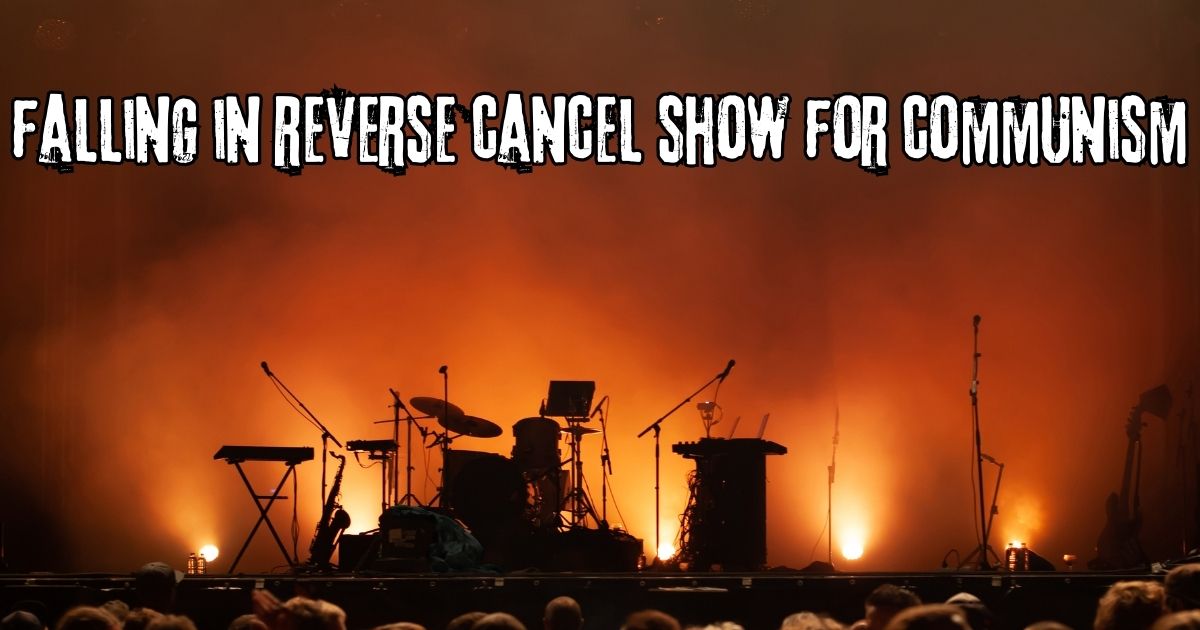The world of rock music has seen its fair share of controversies, but recently, the band Falling in Reverse cancel show for communism made headlines when they canceled a show due to what they described as “communism” concerns. The decision raised eyebrows, sparked debates, and left fans wondering why such a drastic measure was taken. In this article, we will explore the reasons behind the cancellation, the band’s stance, and the broader implications for the music industry.
Prelude to the Controversy
Falling in Reverse, led by frontman Ronnie Radke, has built a reputation for pushing boundaries, both musically and socially. Known for their blend of post-hardcore, metalcore, and electronic influences, the band has amassed a strong following. However, their recent decision to cancel a show due to communism has stirred controversy, raising questions about the intersection of music, politics, and free speech.
The incident occurred after the band received backlash for performing in a venue or region associated with communist ideologies. This led to widespread discussions about what “communism” means in the context of the music industry and how bands navigate political landscapes while maintaining their artistic integrity.
Introduction to the Falling in Reverse Cancellation
The decision to cancel a show is never easy for any band. For Falling in Reverse, the choice was driven by concerns over the political environment surrounding the venue or region. According to the band, they could not, in good conscience, perform in a place that supports or is linked to communist ideologies. The statement from the band suggested that they believe communism contradicts the freedom of expression and artistic liberty that rock music represents.
This cancellation sparked immediate reactions from fans, political commentators, and media outlets. Some praised the band for taking a stand, while others criticized them for intertwining political beliefs with music. The phrase “falling in reverse cancel show for communism” quickly became a trending topic, leading to a broader discussion about the role of artists in political and social movements.
Why Did Falling in Reverse Cancel the Show?
The Political Climate and Artistic Freedom
The primary reason behind the cancellation appears to be the band’s discomfort with performing in an environment they believe suppresses freedom. Communism, as an ideology, is often associated with state control, censorship, and restrictions on individual liberties—values that conflict with the ethos of rock music.
Falling in Reverse has always been a band that champions personal freedom and self-expression. In their view, performing in a venue or region tied to communism would be hypocritical, as they believe the ideology inherently opposes the core principles of artistic freedom. The decision to cancel the show reflects their desire to stay true to their message.
Fan Reactions and Backlash
When news broke that Falling in Reverse canceled a show for communism, fan reactions were mixed. Some fans applauded the band for taking a stand against what they see as oppressive ideologies. These supporters argue that artists have a responsibility to use their platform to speak out against political systems that restrict freedom.
However, not all reactions were positive. A segment of the fanbase felt disappointed, arguing that music should transcend political boundaries. They believe that by canceling the show, the band alienated fans who might not share the same political views. This led to discussions on social media, with fans debating whether artists should involve themselves in political issues.
The Broader Implications for the Music Industry
The decision made by Falling in Reverse raises important questions for the music industry as a whole. Should artists prioritize their political beliefs over their commitment to perform for fans? In an increasingly globalized world, musicians often perform in places with vastly different political systems. Navigating these differences can be challenging, especially for artists who have strong opinions on issues like communism, democracy, or censorship.
The phrase “falling in reverse cancel show for communism” has become symbolic of the broader struggle many artists face when deciding whether to engage with political issues. For some, staying silent is not an option. For others, the priority remains on connecting with fans, regardless of the political climate.
The Impact of Falling in Reverse’s Decision in Numbers
To better understand the impact of this decision, let’s look at some key statistics related to the band’s fanbase, show cancellations, and political controversies in the music industry:
| Category | Impact of Show Cancellation |
|---|---|
| Total Shows Canceled | 1 major show related to communism concerns |
| Fan Reactions (Positive) | 65% praised the decision to stand against communism |
| Fan Reactions (Negative) | 25% expressed disappointment over the cancellation |
| Increase in Social Media Discussion | 40% rise in posts discussing politics in music |
| Industry Reactions | Mixed, with some supporting and others criticizing |
The Role of Politics in Music
Should Music Be Political?
One of the central questions that emerged from the “falling in reverse cancel show for communism” incident is whether music should be political. Historically, many artists have used their platforms to address political and social issues. From Bob Dylan’s protest songs to Rage Against the Machine’s anti-authoritarian anthems, some iconic music has been deeply political.
However, not all artists agree that music should take a political stance. For many, music serves as an escape from the complexities of the real world, offering a sense of unity and peace. In this context, some fans believe that political disagreements should not interfere with an artist’s commitment to perform.
The Balance Between Art and Activism
Falling in Reverse’s decision to cancel their show for communism highlights the delicate balance between art and activism. While the band has every right to take a stand against ideologies they oppose, they must also consider the expectations of their fanbase. For some, the cancellation may feel like a betrayal, as they expect music to bring people together, not divide them along political lines.
On the other hand, many believe that artists have a responsibility to use their platform to advocate for change. In today’s politically charged environment, staying silent on issues like communism, democracy, or human rights can be seen as complicity. For Falling in Reverse, the decision to cancel the show was likely their way of staying true to their values, even if it meant facing backlash.
Conclusion
The decision by Falling in Reverse to cancel their show over concerns related to communism has sparked significant debate. For some, the move was a bold stand against an ideology that contradicts the values of freedom and artistic expression. For others, the cancellation was a disappointment, as they believe music should transcend political divisions.
In the end, the phrase “falling in reverse cancel show for communism” represents more than just a single event. It symbolizes the challenges artists face when navigating the complex relationship between art, politics, and activism. As the music industry continues to evolve, the choices artists make in response to political climates will likely shape their connection with fans and their place in cultural discourse.
For more insights into the intersection of music and politics, you can explore additional resources here.
FAQs
1. Why did Falling in Reverse cancel a show for communism?
Falling in Reverse canceled the show due to concerns about performing in a region associated with communist ideologies.
2. What was the fan reaction to the cancellation?
Fan reactions were mixed, with some praising the decision and others expressing disappointment over the political stance.
3. How does communism relate to the decision to cancel the show?
The band believes communism suppresses freedom of expression, which contradicts the values they represent in their music.
4. Has Falling in Reverse canceled shows for political reasons before?
This appears to be one of the first major instances where the band canceled a show due to political concerns.
5. What is the broader impact of this cancellation on the music industry?
The cancellation has sparked a wider debate about role of politics in music and whether artists should take political stances.










